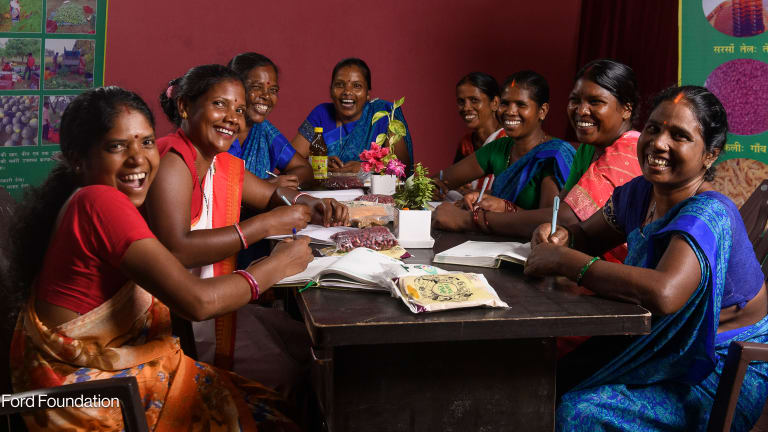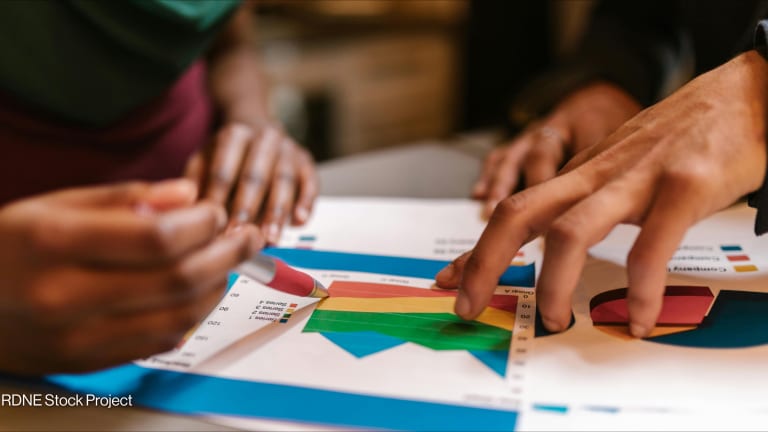Q&A: What are best practices to engage women philanthropists?
Women are taking an increasing role in philanthropic giving, says Elizabeth Dale, lead researcher on a new report that explores the unique approaches of women's fund and foundation donors.
SAN FRANCISCO — Understanding how gender shapes giving behavior is key to unlocking the full potential of women’s philanthropy. That is one of the guiding beliefs of the Women’s Philanthropy Institute, which conducts research with the goal of growing this field. Its latest report, “All in for Women and Girls: How women’s fund and foundation donors are leading through philanthropy,” explores the unique giving approaches of women’s fund and foundation donors. “We ... know that women have greater access to wealth. And we see more and more high net worth women who are in charge of their families’ giving.” --— Elizabeth Dale, assistant professor of nonprofit leadership, Seattle University Devex spoke with Elizabeth Dale, assistant professor of nonprofit leadership at Seattle University and the lead researcher on the report, about the findings and what lessons they hold for NGOs looking to engage women philanthropists. This interview has been edited for length and clarity. Your research finds that women’s fund and foundation donors take a holistic approach to their philanthropy, for example by integrating giving and volunteering. What can other donors learn from the women’s funding movement? What other philanthropists can learn from these donors is this consistent and involved support can produce some measurable change. The fact that these donors are committed financially as well as intellectually and socially — and have been focused in this work often for 10 years or more — means that we're starting to see results. So this can really be a model for other donors who are looking to see similar social changes take place. What do you see as the main takeaways of this research for NGOs looking to engage women’s fund and foundation donors, or any philanthropists who might identify as activist philanthropists? We've documented the increasing role that women are taking in philanthropic giving. We also know that women have greater access to wealth. And we see more and more high net worth women who are in charge of their families’ giving. So it's important for these organizations to know that we're talking about a significant and growing group of women donors they should be paying attention to. We know that many of these women want to be involved in their giving beyond just writing a check. They want leadership opportunities, they want board positions, they want to provide their knowledge or expertise to organizations — and they're willing to be advocates as well. So organizations really need to think about their relationships with donors in this more comprehensive way, to be able to offer a menu of opportunities that help donors deepen their commitment with the organization and on the issue that they care about. As a former fundraiser, I know that takes more work on the part of the organization, but again if the organization is taking the long view, the result can often be larger and more sustained support on the part of the donor. International development is a really interesting field for this work to take place because often donors are far removed from where the work is taking place, so the challenge is how to build those connections and deepen those relationships. I’ve heard great examples from donors of organizations that do it well — who, you know, Skype from the field to show the impact that their gifts are having — and that's ultimately what leads to another gift. Let’s talk about some other creative strategies. Population Service International frames its Maverick Collective initiative as an effort to engage high net worth women in issues facing women and girls by tapping into their time, talent, and treasure. What are some other efforts you’ve seen that provide women donors who take a more holistic approach to their giving with the experience they are seeking? I think this is a trend that is in flux and organizations are still in many ways catching up to what donors are demanding. But a few models have helped support this approach to philanthropy. One is women’s funds and foundations, which are often at the community level. Women Moving Millions and the Women Donors Network are donor networks and within them individual donors will have different funding priorities. The role of the network is often to serve as a form of philanthropic education and networking for donors, and then to also highlight women's capacity to be philanthropists. PSI's Maverick Collective and CARE’s Embark initiative are different in that they’re originating from nonprofit organizations that are building the relationship directly with donors. Both of them are offering donors an opportunity to make a significant gift and provide their skills and knowledge to the problem they want to focus on. They recognize that donors want to provide more than just their financial resources and they’re using these models to invite them into the organization's work in a deeper way. This also seems to appeal to a younger generation of donors, which I find really important, because this group of donors could make even more significant financial gifts in the future. This isn't always easy for the organizations to do, there's challenges for the organizations and donors to work through, but these models are gaining momentum. In terms of other organizations adopting these models, nonprofits really need to realize that donors preferences are changing, and that donors want to be part of the work. This research comes at a time that some foreign aid for issues facing women and girls is on the decline or in question. What is your advice for nonprofits who are facing these challenges and looking to philanthropy with a renewed sense of urgency? One thing for organizations to be cautious about is always focusing on the negative. Philanthropy often comes about because we want to see a change. And there is something positive embedded in philanthropy as being kind of hope for the future. And so at the same time organizations can talk about the urgent need in this particular time, it’s also about what those donor gifts can make possible. And in this time of retrenchment in public support, or countries, looking inward, philanthropic giving might be the source of support that sustains a lot of this work until those political tides change. Many of the people who work in international NGOs are drawn to that work for very similar reasons as donors are to the causes they care about. So it's about connecting your passion for the work with a donor’s passion for the issue and showing how your organization can help that donor achieve a goal that you both care about. I really believe in being a reflective practitioner, and I think sometimes that can get lost in the work. Having practitioners reconnect with those reasons of why they were called to do that work in the first place can help those donor relationships develop in a really authentic way that is also fulfilling for both parties involved.
SAN FRANCISCO — Understanding how gender shapes giving behavior is key to unlocking the full potential of women’s philanthropy. That is one of the guiding beliefs of the Women’s Philanthropy Institute, which conducts research with the goal of growing this field.
Its latest report, “All in for Women and Girls: How women’s fund and foundation donors are leading through philanthropy,” explores the unique giving approaches of women’s fund and foundation donors.
Devex spoke with Elizabeth Dale, assistant professor of nonprofit leadership at Seattle University and the lead researcher on the report, about the findings and what lessons they hold for NGOs looking to engage women philanthropists.
This story is forDevex Promembers
Unlock this story now with a 15-day free trial of Devex Pro.
With a Devex Pro subscription you'll get access to deeper analysis and exclusive insights from our reporters and analysts.
Start my free trialRequest a group subscription Printing articles to share with others is a breach of our terms and conditions and copyright policy. Please use the sharing options on the left side of the article. Devex Pro members may share up to 10 articles per month using the Pro share tool ( ).
Catherine Cheney is the Senior Editor for Special Coverage at Devex. She leads the editorial vision of Devex’s news events and editorial coverage of key moments on the global development calendar. Catherine joined Devex as a reporter, focusing on technology and innovation in making progress on the Sustainable Development Goals. Prior to joining Devex, Catherine earned her bachelor’s and master’s degrees from Yale University, and worked as a web producer for POLITICO, a reporter for World Politics Review, and special projects editor at NationSwell. She has reported domestically and internationally for outlets including The Atlantic and the Washington Post. Catherine also works for the Solutions Journalism Network, a non profit organization that supports journalists and news organizations to report on responses to problems.








